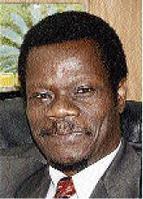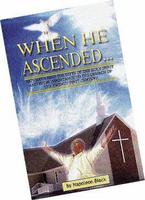
Dr Gosnell L. Yorke, professor of religion in the School of Religion and Theology at Northern Caribbean University. - Contributed
Book: When He Ascended: Rediscovering the Gifts of the Holy Spirit and Their Importance to the Church of the Twenty First Century by Napoleon Black.
Publisher: Self-published and printed by Digital Solutions (Jamaica), 234 pages.
Reviewer: Dr Gosnell L. Yorke (PhD), professor of religion, Northern Caribbean University, Mandeville.

The author Napoleon Black is pastor at Marverly Gospel Hall in Kingston. In his book, he provides readers with a somewhat popular volume dealing with an immensely relevant subject 'for the church of the twenty first century' . He makes no explicit mention of the scholars with whom he is in dialogue although he clearly is aware of the basic discussion going on among them. In addition (for good or ill), he chooses not to include a bibliography or works consulted at the end of it either.
He discusses the proper identification and effective utilisation of the many gifts of the Holy Spirit (technically called the charismata) that have been bequeathed to each and every one of us as believers.
In 10 chapters, the author walks the reader through the relevant literature on the subject. In addition to the epistles Romans, 1 Corinthians, Colossians and Ephesians, he also incorporates the four Gospels, the Book of Acts, the Book of Hebrews, the letters of John and those of Timothy and Titus.
Not surprisingly, perhaps, the author discusses not only the importance of the spiritual gifts themselves to the building up and efficient operation of the local church, but also discusses their overall purpose, their nature, how they are distributed or imparted to individually baptised believers, how they are to be maintained and exercised, how long they will endure (up to the ultimate establishment of the New Jerusalem on a renovated Earth according to the author) and how best to guard against the presence and power of some of the counterfeit Satan-inspired gifts - be it so-called gifts of exorcism, healing, deliverance or what-not.
Of the inexhaustive lists of gifts we find in the New Testament which the author discusses, he rightly includes administration, apostleship, evangelism, healing, hospitality, interpretation, knowledge, leadership, music, pastoring, prophecy, serving, sharing, speaking in tongues or unknown languages and wisdom.
Discover and employ your gift

Black
There are at least two things articulated in the volume with which this reviewer concurs.
1) Particularly useful for the local church was the author's insistence that each baptised member is gifted through the Spirit and that although, at times, different members might have the same gift or gifts but to a different degree, he/she should be encouraged to discover and employ that gift or those gifts (including his/her latent talents and abilities). In other words, no one should be considered ungifted and, therefore, unimportant or unusable - no matter how young or old, recent or long-standing in the church;
2)That everyone but especially those who occupy prominent and powerful positions in the church like pastor-teachers and public evangelists should be guided by the 'love chapter' of 1 Corinthians 13 - a chapter which is to be placed squarely within the context of the spiritual gifts (encompassing chapters 12-14) and not reserved exclusively for the 'wedding ceremony' as some seem to do; that such prominent and powerful persons in the church should jealously guard against the temptation to prey on the vulnerable in that they do not exploit them for gain of any sort - be it economic, sexual or whatever.
The volume was not without theological positions in conflict with the reviewer's own convictions. First, somewhat arbitrarily, it seems, the author uses the inexhaustive lists of gifts we find in the New Testament in order to make a clear distinction between what he calls a 'Covenant Meeting' and a 'Charisma Meeting' - with the former pointing mostly to the sacrament of holy communion and the latter based, supposedly, on the exercise of the various gifts themselves. For one thing, the Apostle Paul seems to bring the two 'meetings' together in 1 Corinthians 10 and 11 without making any clear distinction between them at all. There, the apostle discusses both the spilled blood and the broken body of Christ (see 1 Corinthians 10:16-17) and the metaphor of the church as His body in the same context (see 1 Corinthians 11:29). This is not dissimilar to the false distinction and contrast the author also seeks to make between the Lord's Supper and the Lord's Sabbath (see Pages 38 and 39) as if one has to opt for one or the other - and not for both as we should and as the early Christians clearly did - including Jesus Himself (see Luke 4:16 and 22:14-19).
Three-part division
Second, the author makes a somewhat creative three-part division and distinction among the various gifts by aligning each of them with either the human body (such as those of serving and sharing), the mind (those of knowledge and wisdom) or the spirit (those of speaking in unknown languages and the interpretation of them) - a distinction which seems too 'neat and tidy' for the evidence at hand. For that distinction, see page 129 and elsewhere.
Overall, the volume is well edited. However, he made a few factual errors. I think that the author ought to have dated the complete collection or canon of the New Testament books as we now have them as early 367 AD (based on the list of Bishop Athanasius) and not as late as 405 AD as he does on Page 177. Also, he ought to have mentioned Moses and not his older brother, Aaron, as the one whose rod the miracle-working Lord transformed into a snake and back into a rod again (see Page 220). And he should have kept Lazarus, Mary and Martha's brother, in the tomb for four full days instead of two before Jesus came along as the Resurrection and the Life to bring Lazarus back to life again (see Page 224).
Again, this is a fairly useful but popular book worthy to be read by those committed to the efficient operation and administration of the local church.
I would have wished, however, to see the author make some attempt to ground his discussion far more explicitly in the ongoing life of the contemporary church in the Caribbean in which he was writing and is ministering.

